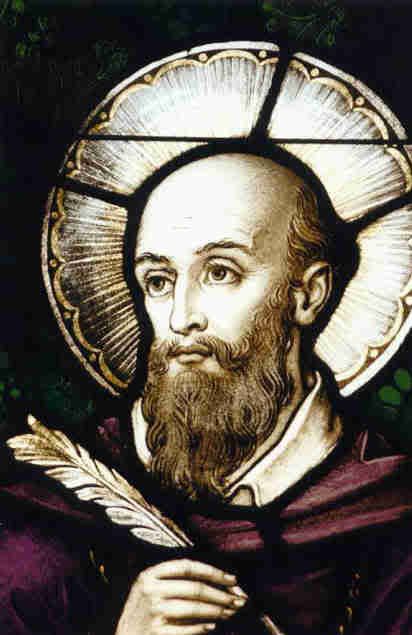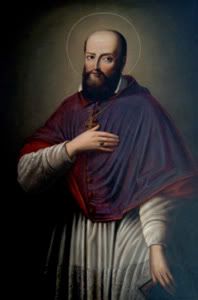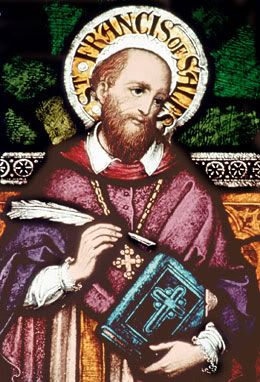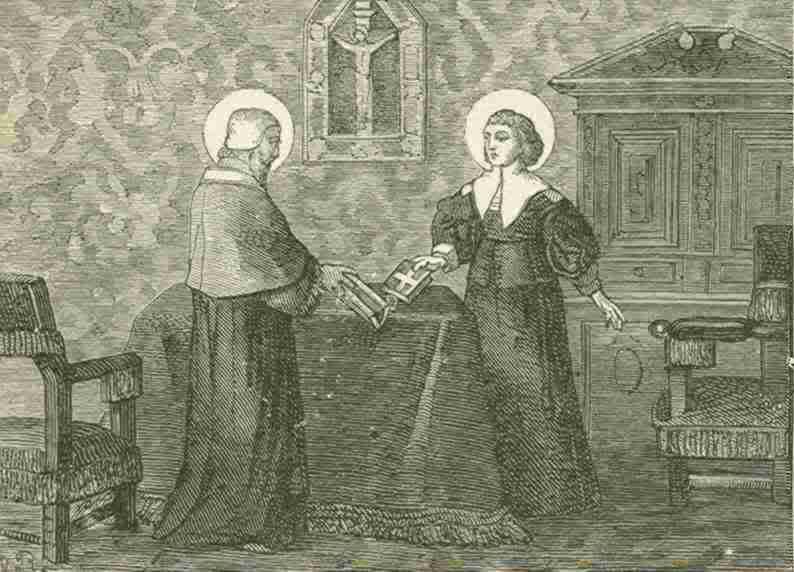Born into a noble family in France, and expected to become a solider or lawyer, Saint Francis felt called to the priesthood at a young age. However, in a pattern that would repeat throughout his life, he waited thirteen years to be certain of his calling. During that time, he traveled, attended university, and earned a doctorate in law. Possessing a quick temper, by his own report, Francis dedicated himself to studies of theology, mental discipline, and prayer during his time at university. Tradition holds that despite encouragement from local priests and bishops, as well as teachers, Saint Francis was not convinced that the Lord was calling him to the priesthood until a series of falls while out riding his horse one afternoon. During his ride, Francis was thrown three times from his horse. Each time, his sword fell from its scabbard, landing as a cross. Upon his third viewing of the cross, Saint Francis returned home to seek parental permission to join the priesthood.
Saint Francis was ordained during the time of the Calvinist Reformation. Just over the mountains from his home in France lay a community of approximately 60,000 Catholics who had renounced the Church, becoming Calvinists. Francis felt moved to venture into the Swiss community and reclaim the converts. Unable to find anyone to accompany him, he embarked alone, on foot, traveling through rough, cold, and snowy country. He visited families in the wilderness, knocking on doors, oftentimes treated poorly. Despite rejection and years of work without moving a single soul, Saint Francis never gave up. He painstakingly wrote sermons and homilies out by hand, slipping them under doors, becoming one of the first to do so (and becoming the patron saint of journalists in the process). He slept outside, or in haylofts if possible, oftentimes freezing. His feet, from being constantly cold and wet, became infected and bled. Yet, he did not give up. When parents would refuse to speak with him, he would play instead, with their children. Observing his gentle disposition, patience, and conviction, the parents would oftentimes come around and entertain a conversation. Over the course of several years, Saint Francis’ patience and steadfast determination brought over 40,000 back to the Church. He was appointed Bishop of Geneva.
It was during this time in his life that he met a widow, whom he had observed during Mass, paying close attention to his sermons. Jane Frances de Chantal became a friend, and later asked Francis to become her confessor. Again, Francis hesitated, praying, and waiting to determine if this was the will of God. During that time, a man approached Francis three times regarding his thoughts of donating a building to be used as a holy place for women. As typical, Saint Francis listened, but did not push the man. On his third visit, the man donated a building, which would become the convent of the sisters of the Order of the Visitation of Holy Mary.
Jane Frances de Chantal, herself a saint, offered herself to Mary, Mother of God, as a young orphan, assuring herself of the Blessed Mother’s protection throughout a difficult life. Following marriage to a wealthy noble, Jane Frances experienced significant difficulty and loss, including the death of two children and her sister, and the eventual murder of her husband by a friend. Following these losses, Saint Jane Frances endured financial struggles, and was repeatedly taken advantage of by friends, servants, and acquaintances. Never losing faith, Jane Frances left her home, determined to live a life for God alone. With Saint Francis, she founded a great order—the Order of the Visitation of Holy Mary—a holy order for young and old women alike, dedicated to the Heart of Jesus, and committed to the Christian traits demonstrated by Elizabeth during her visitation with the Blessed Mother. The special charism of the Visitation Order combines gentleness with a valiant spirit. Both apostolic and contemplative, sisters of the order balance a dedication to prayer with a serving presence in the world. Eighty-seven houses of the Visitation were built in nine years during the time of Saint Jane Frances. Today, the Order numbers approximately 3,000 sisters, with presence in 168 monasteries throughout the world. At age 70, Saint Jane Frances de Chantal died peacefully. St. Vincent de Paul reported seeing, at the moment of her death, her soul ascend, as a ball of fire, to heaven. Her feast day is celebrated on August 21.
Saint Francis de Sales went on to write many works on the Catholic faith, oftentimes copying them by hand for distribution to the faithful. He further spent hours each day answering letters by hand, providing spiritual direction and catechetical instruction. As bishop, he tirelessly preached, reaching out to the poor. He instituted guidelines for clergy, and became one of the first to offer organized catechetical instruction to the young and old alike. His written works, including “An Introduction to the Devout Life” and “Treatise on the Love of God” are still regarded by the Church as “a bright light… pointing out to souls an easy and safe way to arrive at the perfection of a Christian life" (Breviarium Romanum, 29 January, lecture VI).
In 1622, Saint Francis traveled to France, where he was to die at the age of 56. His remains (with the exception of his heart, which was left in Lyons) were returned to the Convent of the Visitation of Holy Mary in Annecy, where numerous miracles have been reported by his tomb. During the French Revolution, his heart was carried by the Visitation nuns from Lyons to Venice, where it is still venerated today
 Saint Francis lived an austere and simple life, minimizing his possessions so as to better focus on the will of the Lord. His writings reinforce the two elements of a spiritual life: love and penance, with love being primary. He taught that penance should be practiced from a place of love for Christ, a motive of simple, gentle, and generous fidelity to the will of God. He wrote, of exemplifying Christ in our lives, "You will study His countenance, and perform your actions as He did." For Saint Francis, the key to love of God was prayer. He wrote, "By turning your eyes on God in meditation, your whole soul will be filled with God. Begin all your prayers in the presence of God." But prayer was not enough. The truth of prayer was reflected in a person's actions: "To be an angel in prayer and a beast in one's relations with people is to go lame on both legs."
Saint Francis lived an austere and simple life, minimizing his possessions so as to better focus on the will of the Lord. His writings reinforce the two elements of a spiritual life: love and penance, with love being primary. He taught that penance should be practiced from a place of love for Christ, a motive of simple, gentle, and generous fidelity to the will of God. He wrote, of exemplifying Christ in our lives, "You will study His countenance, and perform your actions as He did." For Saint Francis, the key to love of God was prayer. He wrote, "By turning your eyes on God in meditation, your whole soul will be filled with God. Begin all your prayers in the presence of God." But prayer was not enough. The truth of prayer was reflected in a person's actions: "To be an angel in prayer and a beast in one's relations with people is to go lame on both legs."Day 24 of 365
Prayer Intentions: Humility, Patience, Forgiveness of others, and Love; Those suffering in the aftermath of the Haitian earthquake
Requested Intentions: Those considering or having attempted suicide (Pr. L); Those who serve the Archdiocese of Los Angeles (N); Safety of friend/ relief worker in Haiti (L); Health and safety of new daughter (J); Renewal of loving Christ-centered relationship (A).












0 comments:
Post a Comment
Thanks for leaving a comment. If you wish to submit a prayer request, however, please do so above, using the "Contact" tab.